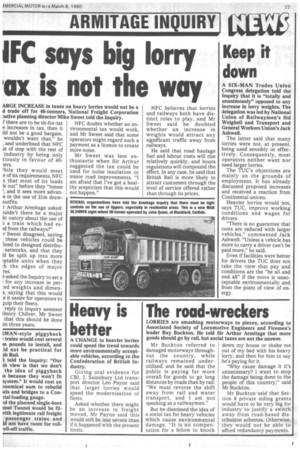IFC says big lorry lax is not the w
Page 25

If you've noticed an error in this article please click here to report it so we can fix it.
ARGE INCREASE in taxes on heavy lorries would not be a d trade off for 40-tonners, National Freight Corporation 3utive planning director Mike Sweet told the Inquiry.
f there are to be tit-for-tat e increases in tax, then it Lid not be a good bargain. wouldn't want that," he , and underlined that NFC Lit of step with the rest of industry by being only tiously in favour of 40lers.
'hile they would meet e of its requirements, NFC s that most of its loads k out" before they "tonne ', and it sees more advan!s in the use of 21m draw outfits.
r Arthur Armitage asked: )uldn't there be a major lic outcry about the use of a a train which had es?.d from the railways?"
r Sweet disagreed, saying these vehicles could be 'Med to designed distribunetworks, and that they Id be split up into more !ptable units when they the edges of major res.
2 asked the Inquiry to set a for any increase in perled weights and dimens, saying that this would :e it easier for operators to quip their fleets.
reply to Inquiry assessor Henry Chilver, Mr Sweet that this should be done in three years. NFC doubts whether an environmental tax would work, and Mr Sweet said that some operators might regard such a payment as a licence to create more noise.
Mr Sweet was less enthusiastic when Sir Arthur suggested the tax could be used for noise insulation or minor road improvements. "I am afraid that I've got a healthy scepticism that this would not happen." NFC believes that lorries and railways both have distinct roles to play, and Mr Sweet said he doubted whether an increase in weights would attract any significant traffic away from railways.
He said that road haulage fuel and labour costs will rise relatively quickly, and hours regulations will compound the effect. In any case, he said that British Rail is more likely to attract customers through the level of service offered rather than through its prices.












































































































































































